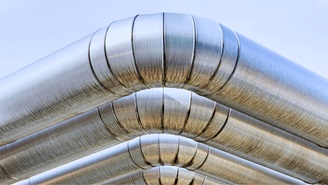Cleaner shipping has been a trending topic particularly since the International Maritime Organization (IMO) declared that 2020 will mark the “beginning of a decade of action and delivery” for the shipping industry.[i] A key approach to cleaner shipping is for companies to renew their fleet with more environmental-friendly vessels. However, this approach triggers an obsolescence of older vessels and increases shipbreaking activity. In Sustainalytics’ 10 for 2020 report, we mention the issue of shipping practices with large environmental impacts including shipbreaking practices which we will explore more in depth in this article.
In recent reports, experts have forecasted a significant increase in shipbreaking activity over the next few years. [ii] Two main trends explain this dynamic:
- The planned end-of-life of ships resulting from the maritime freight boom in the 1970s-1980s.
- The lack of competitiveness of old ships compared to the most recent, particularly on criteria such as fuel consumption and toxic emissions, which have become increasingly relevant due to stricter environmental regulations established globally.
Shipbreaking is one area of the shipping industry for investors to consider when developing portfolio strategies aiming to mitigate environmental risks. From environmental impact on life bellow water to health impact for demolition workers, the consequences of shipbreaking are often dire and shipping companies do not appear sufficiently prepared to deal with the ramifications.
Environmental and Social impacts of Shipbreaking
The global trend in shipbreaking management has long been to subcontract the transfer and dismantling operations to less developed countries with loose environmental regulations and low scrutiny. Still today, 98% of shipbreaking in the world is carried out in Bangladesh, China, India, Pakistan and Turkey.[iii]
Currently over 70% of ships end their life in South Asia, and are broken under poor safety conditions on beaches, hence this practice is known as ‘beaching’.[iv]
Almost all ships ordered to be dismantled contain harmful substances such as asbestos, fuel deposits, lead paint, other heavy metals, toxic biocides as well as PCBs and even radioactive substances.[v] During the dismantling of the ship, all these byproducts are at risk of polluting the ocean and threatening local ecosystems.
In addition, shipbreaking practices are linked to severe occupational health problems. According to the International Labour Organization (ILO), shipbreaking remains amongst “the most dangerous of occupations, with unacceptably high levels of fatalities, injuries and work-related diseases.”[vi] Many workers at shipbreaking yards have died or remain disabled due to accidents, such as explosions caused by tanks which have not been emptied of fuel or accidents caused by the lack of safety measures. The toxic fumes and materials to which worker are exposed throughout the day is also linked to severe illnesses such as cancer.[vii]
Evolving Regulations
With the growing concern to move towards a cleaner shipping industry, shipbreaking will play an increasingly important role in corporate activities and investor decisions. Current regulatory frameworks looking to govern shipbreaking activities include the Basel Convention, OECD and ILO guidelines, and the European Union Ship Recycling Regulation, which came into force in January 2019. However, many boats sail under flags of convenience, including Panama, Liberia and Marshall Islands, making it possible to escape the rules laid down by international organizations and governments.
Moving one step closer towards cleaner and safer shipbreaking, India, the largest shipbreaking country, has become the 15th state to ratify the Hong Kong Convention on the Safe and Environmentally Sound Recycling of Ships in November 2019.[viii] The Convention established in 2009, would set a standard that prevents current dirty and dangerous practices.[ix] However, it will only come into force once (1) at least 15 states have ratified it; (2) the merchant fleets of the ratifying states account for 40 per cent of global gross tonnage; (3) the ratifying states have recycled at least 3% of their combined tonnage over the past ten years. Currently, an additional 10% of the tonnage and 0.4% of the recycling volumes are needed for the Convention to come into force.[x]
Weak Management and Increased Scrutiny
At Sustainalytics, as part of shipping materiality issues, we assess emissions, effluents and waste. Shipping companies are exposed to regulatory and financial risks regarding any non-compliance with the new global 0.5% cap on the Sulphur content of fuel and ballast water regulations, while the industry as a whole is facing increasing scrutiny over shipbreaking practices.[xi] Environmental violations can expose companies to millions of dollars in fines and clean-up costs, as well as potential temporary bans from accessing ports. Our assessment of shipbreaking programs is based on the consideration of their impact on business decisions, initiatives to minimize their impact, as well as the monitoring and reporting of shipbreaking practices. As illustrated in the chart below, our research shows that 70% of shipping companies in our comprehensive universe have no shipbreaking program or do not communicate on it, and a mere 10% show sufficiently strong programs. Overall, companies do not appear prepared to manage the associated legal risks linked to this controversial activity.
Shipbreaking Program Assessment of Shipping companies in Sustainalytics Comprehensive Universe
With scrutiny of ship recycling practices growing in recent years, both reputational and legal risks to companies involved in poor end-of-life practices are also likely to increase. Just recently in February 2020, Norwegian authorities opened an investigation into Teekay Shipping Norway over Shipbreaking[xii]. Previously in 2019, ship owner Holland Maas Scheepvaart Beheer II BV paid a combined settlement of EUR 3 million for illegally scrapping a vessel on the beaches of India.[xiii] In 2018, the Shipping company Seatrade was fined fines for selling vessels to shipbreakers in India. Similar cases are being investigated across Europe, involving well-known shipping companies.
Moving towards cleaner shipbreaking practices
To reduce shipping companies’ exposure to the reputational and legal risks, more responsible shipbreaking practices need to be established. For ship owners, this includes the following measures:
- Sell their ships off beaches to dry-docks that respect the Hong Kong Convention and are ready to invest in worker safety and environmental standards to treat and store hazardous wastes.
- Increase the use of reused, recycled, repurposed and renewable material content to reduce waste
- Acquire ISO 30000 standard certification for ship recycling management systems
- Have an inventory of hazardous materials.
For more information on the contents of this blog, please contact helene.gaudin@sustainalytics.com, and see her article in our recent report, 10 for 2020: Creating Impact Through Thematic Investing.
Sources:
[i] https://sdg.iisd.org/news/imo-promotes-sustainable-shipping-for-a-sustainable-planet/
[ii] https://www.skibskredit.dk/media/2000/shipping-market-review-december-2019.pdf
[iii] http://www.industriall-union.org/worlds-largest-shipbreaking-country-ratifies-hong-kong-convention
[iv] https://www.shipbreakingplatform.org/our-work/the-problem/
[v] https://www.shipbreakingplatform.org/issues-of-interest/why-ships-are-toxic/
[vi] https://www.ilo.org/safework/areasofwork/hazardous-work/WCMS_110335/lang–en/index.htm
[vii] https://www.fidh.org/IMG/pdf/shipbreaking2005a.pdf
[viii] http://www.industriall-union.org/worlds-largest-shipbreaking-country-ratifies-hong-kong-convention
[ix] https://www.shipbreakingplatform.org/issues-of-interest/the-law/hkc/
[x] http://www.industriall-union.org/worlds-largest-shipbreaking-country-ratifies-hong-kong-convention
[xi] http://www.imo.org/en/MediaCentre/HotTopics/Pages/Sulphur-2020.aspx; https://www.dnvgl.com/news/baltic-sea-first-marpol-special-area-for-sewage-100367
[xii] https://www.maritime-executive.com/article/norwegian-authorities-investigate-teekay-subsidiary-over-shipbreaking
[xiii] https://www.ship-technology.com/news/dutch-prosecutor-fines-holland-maas/
Recent Content
DEI Rollbacks: Impact on ESG Risk Ratings and Broader Implications for Investors
This article covers how not all reported rollbacks in diversity, equity, and inclusion (DEI) initiatives will have the same impact. Due to the relatively low weight of DEI in Sustainalytics’ ESG Risk Rating, we do not anticipate significant changes to overall ratings.
Industrial-Scale Decarbonization in the EU: Stewardship Field Notes From Germany, France and Spain
This article covers how Morningstar Sustainalytics’ Stewardship Team embarked on a field trip in November 2024 to learn how EU industry leaders are navigating the complex challenges of the energy transition.






